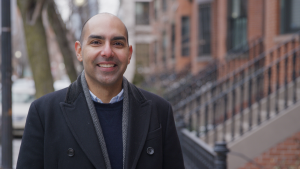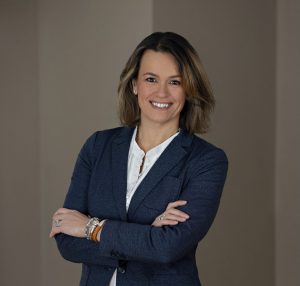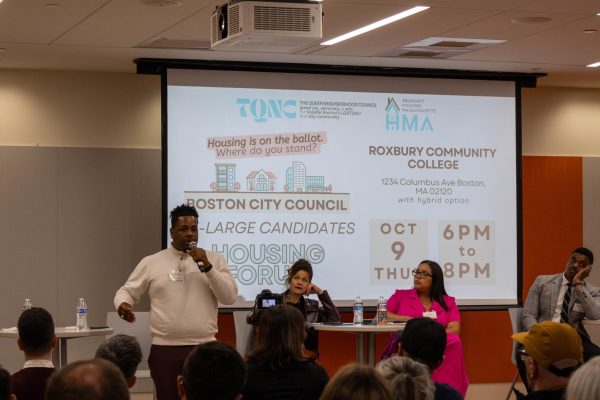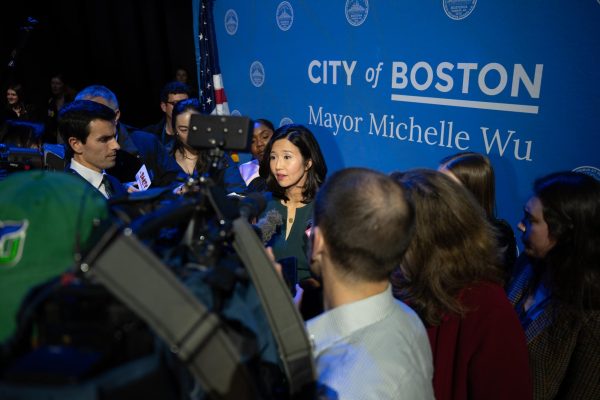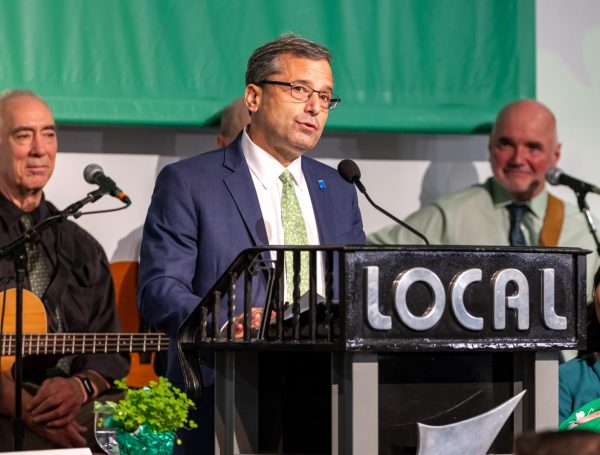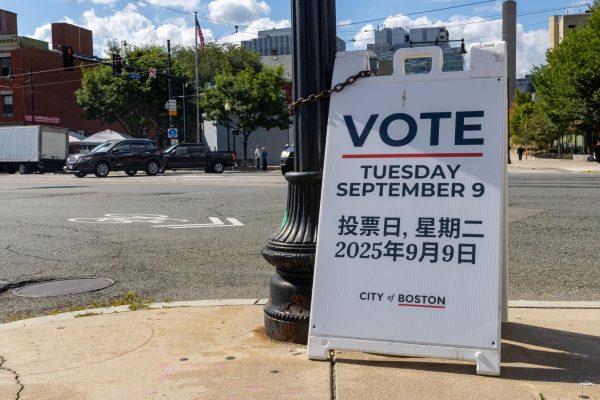Mayoral race: Q&A with John Barros
John Barros, Marty Walsh’s former Chief of Economic Development, announced his candidacy for mayor of Boston on March 4th after resigning from his role the week prior, becoming the fifth candidate to join the race.
Barros, who was born and raised in Roxbury, has been a member of the Boston School Committee under Mayor Menino’s administration as well as a member of the board at the schools he helped found while working at the Dudley Street Neighborhood Initiative. Barros ran for mayor in 2013, a race in which he placed sixth out of twelve candidates before joining Walsh’s administration.
“I’ve helped lead the city through a pandemic and I didn’t have that before,” he said. “I’ve helped lead the city through some of its biggest economic booms and I didn’t have that before. So all of those things I think makes me better and more prepared to lead today.”
Barros co-own a restaurant in Dorchester, Restaurante Cesaria, where he announced his candidacy. His first job, he said, was stocking shelves at his aunt’s and uncle’s corner store. Then at age 14, Barros said he began working at the Dudley Street Neighborhood Initiative, where he eventually took over the executive director role for 13 years before serving as Chief of Economic Development under the Walsh Administration.
His three top priorities, he said, are reopening the economy in a safe and equitable way, creating more affordable housing, and making sure public schools work for Boston students.
Barros joined a crowded field of candidates who previously announced their run for mayor including City Councilors Michelle Wu, Andrea Campbell, Annissa Essaibi George, State Representative Jon Santiago and Acting Mayor Kim Janey, who announced her run in April, 2021.
John Barros talked to The Scope about which issues he plans to prioritize if elected mayor and how he plans to implement them. The following conversation has been edited for length and clarity.
What do you think is and is not working in Boston and what can be changed?
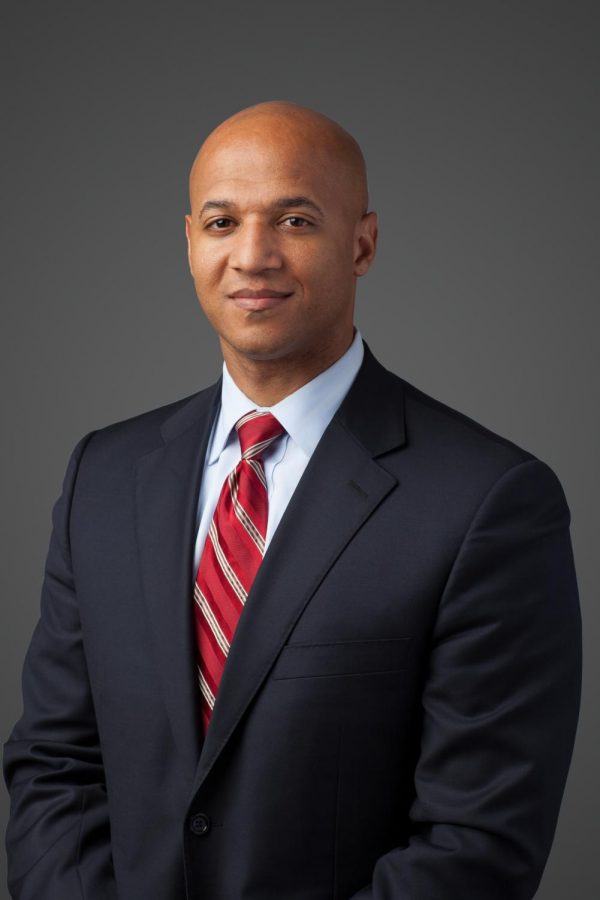
The health inequities that we’ve seen and their disproportionate impact on particularly brown and Black residents of Boston, we need to address that right away. Boston continues to be too expensive for way too many families and we need to address that right away. Our small businesses are hurting, and many of them, we don’t know if they will be able to reopen. That’s something that we need to address right away. I think about the fact that too many of our families will be in risk of eviction. As soon as we lift the eviction moratorium, that is something we need to address, we need to make sure that there’s enough money and a relief fund to address that right away.
What issues do you plan to prioritize if elected mayor?
There are three issues that I plan to prioritize in my administration. The first is to make sure that we get out of COVID safely. Once we get out of COVID safely, to make sure that we are opening a just and equitable economy. We need to make sure one that our small businesses are doing well. Without our small businesses, Boston just can’t be Boston. Without the restaurants in our neighborhoods, without the retailers, many families will continue to lose their livelihood. But then also people aren’t going to want to come back to work in the city. So we’ve got to make sure that we’re paying attention to the bread and butter of our economy, the lifeblood of our economy, which is our small businesses. Investing in small businesses early is going to be critical. The other part that I would think is important in opening our economy is investing in performing arts in the cultural arts. It really does give us our competitive edge as Boston and it will then help the hospitality industry and in turn help the food and accommodations industry as well.
Looking forward to reopening and reopening in an equitable way, I also want to make sure that we have affordable housing, that’s the second priority for my administration. Boston still continues to be an expensive city and we’ve got to make sure that we have options for people who are young professionals, who would like to buy a home and be here in the city. We also need to make sure that we’re creating more affordable housing for our elders, and for those with disabilities. The city uses its own land for development and when it does, it is now asking that two thirds of the housing that goes on the land is affordable. So, leveraging city-owned land and buildings to create affordable housing, like libraries and housing on top of libraries, community centers, and other public assets is going to be important. We also have to ask our neighboring cities and towns to produce more affordable housing, it’s critical. We have got to ask our colleges and universities to continue to build on campus housing and make it easier for them to do that. These are the kinds of things that we need to do to make sure that we have more affordable housing in our city, that we’re able to prevent evictions and prevent displacement.
The third priority is to make sure that Boston is supportive of our young people and is supportive of our children and students. We need to make sure that we have a school district that is well-funded. We need to make sure that we’ve got pathways for young people so that they can actually find the interest that they like, but then also connect that to a possible internship. It’s really important that as mayor, we invest in public education, with an emphasis on closing the opportunity gap for students from low income families, for students of color, for English language learners, and for students with disabilities who require special education. I will make sure that I increase the in-and-out support of schools, particularly for students who are experiencing homelessness and trauma in their lives. We need to also make sure that we create more identity affirming school communities. Our cultures need to be supportive of LGBTQ students, of students of color. We need to have education that starts at birth, from birth to career, that supports the young people through every stage of their development and supports their families and parents in supporting them. Education is a huge priority for me.
Those are the three top priorities, opening the economy back up in a safe and equitable way, creating more affordable housing, and making sure our schools work for our students.
How has your experience prepared you to take on these priorities and what tangible steps do you plan to take to reopen equitably?
I feel like the work that I did at Dudley Street Neighborhood Initiative has really prepared me on those three priorities that I just talked about. One is when it comes to affordable housing, I’ve spent most of my professional life working on affordable housing and making sure that we create ways that prevent displacement and that we create ways that prevent gentrification in our neighborhoods. As executive director of the Dudley Street Neighborhood Initiative, we were able to build affordable housing and create the largest urban land trust in the country to protect the affordable housing that we built. We created hundreds of new affordable housing and rental opportunities for our residents. And then during my time at the city, we’ve produced affordable housing more than any other time in Boston’s history. We recently increased linkage fees on commercial buildings in Boston of over 100,000 square feet in order to fund more affordable housing and workforce development. So I’ve got the experience of both, not only talking about affordable housing, but delivering on affordable housing.
The same thing for the economy, I was the lead for Mayor Walsh, in making sure that we did everything we could to help save small businesses during the pandemic. It was critical that we worked with our small business. Every Tuesday, we would make sure to have a call with all of our small businesses to inform them what was going on and make sure to keep them safe. Then we also created direct financial assistance; we moved more than $20 million to small businesses in the city, and then created a fund specifically for women-owned and minority-owned businesses to make sure that they have the support that they needed. It’s critical that we continue to do the work to support small businesses, but I have the background and experience to do that.
When it comes to schools, the same thing. As Executive Director of the Dudley Street Neighborhood Initiative, I helped to start three different schools in the neighborhood. I was on the board of schools, I’ve helped to create the partnerships around schools that would support our parents and then I got on the school committee and as a school committee member helped to support the entire school system. So, I got the experience needed to hit the ground on day one in helping Boston address the pandemic, helping reopen our economy and helping increase affordable housing as well as making sure that we have a really robust and supported school system that works for all of our students.
During the past four years there’s been criticism of the fact that 0.4% of city contracts going to minority-owned businesses and you’ve been an advocate of mandating that number be 25% or higher, what steps do you plan to take in reversing that past trend?
I think it’s really important to recognize the reason why Boston’s talking about those percentages, is because we went in there committed to releasing that information and making it transparent. Look, Boston’s numbers have never been good, right? There is no year you can go back to and say, ‘Oh, it was great this year, we did a lot of work’ – no. It’s just that government hasn’t really been talking about it. We went in there and we thought transparency was important.
The second thing that was important was making sure that we could create a program based on legal grounds. The mayor has signed an executive order that the minimum spent with women and minority-owned businesses in the city of Boston will be 25%. 25% of all of this discretionary spend by the city will go to women and minority-owned businesses. It’s a mandate, but you got to meet those mandates, and so in order to do that, we got to do things like going in and taking some of our larger contracts and making them smaller.
I’ll give an example. When you look at the transportation contract for BPS, it’s about a $125 million contract. There’s not a lot of people who can transport all of BPS’ students. There’s two ways to make that contract available. One is you can say, ‘Alright, we’re going to split it up into five different zones, or five different contracts at about $25 million each’. Or you can say, ‘If you’re going to win this contract, you need to make sure that at least 25% of your business is going to subcontractors that are owned by women or minority-owned companies. Either way, we’ve got to split it up in a way that makes sense for people to compete on it. We have got to do that with all of our contracts and we have to make sure that the bonding level, which is sort of insurance that you would need to do a contract with the city of Boston, is appropriate. We also need to make sure that if people are going to do business with the city, that we can pay them quicker than 30 days. Right now, it takes 30 days to get a payment from the city of Boston for reimbursement and that’s just too long. Or, we should be floating them and giving them cash flow so that they can pay their expenses until we can reimburse. Those are the kinds of things we need to go in there. I’d love to get back in there and continue the work that I started in moving those numbers in the right direction. While I was in [Chief of Economic Development], I was able to award the largest professional service contract ever to a woman-owned, person-of-color-owned business. We need to do it at a system level and so I’d love to get in there and do some of the things that I just talked about immediately.
In light of the issues the pandemic has brought about regarding education, what steps would you plan on taking in correcting some of the issues that had been exposed through COVID-19?
One of the things that the pandemic taught us about education is that there was a huge digital divide. Some students went home and couldn’t do remote learning because either didn’t have a computer or they didn’t have the internet service. What we had to do was get these [WiFi] hotspots and send them home. In certain cases, we had to buy computers and send them out.
We have to try to do some kind of teaching or tutoring in helping students and parents figure out how to log on, how to use the equipment. We need to make sure that we’re doing more computer science work and that our parents and our students have the kind of access to the internet that they need, because you need that for regular work these days, right? It’s not just remote school – if my kid comes home and needs to look up something, he’s probably going to Google it and try to read an article online. Imagine if you’re the kid who can’t Google these days, right? Imagine if you’re the kid who’s got to try to figure out how to get that information in some other ways. Some of the work that our kids are going to do, they’re going to need to read some books and maybe need to go to the library and that’s fine, but not everything is done like that these days and we’ve got to deal with it.
The other thing that the pandemic showed us about our schools is, many of our students are getting their hot meals from our schools’ meal programs. We need to make sure that we are looking at that more closely as food insecurity is a major issue. Boston needs to be addressing that even when the schools are fully open and the students come back. The pandemic has disrupted education in a way that too many students have disengaged. So many students weren’t plugged in at all and weren’t doing the work. We need to start this summer by bringing students in with attractive, creative and fun learning. I think after this summer, we should always have 12 months of learning. Now 12 months of learning doesn’t mean that you’re necessarily sitting in a classroom in the summer but we should have organized learning enrichment that’s happening for every student during the 12 months, including summer things that are attractive, things that might be outdoors, things that might be project-based, or maybe even jobs-based but hey should be accompanied by lessons in the academics and skills that you will need to be successful in career and in life.
There’s a really cool program on Thompson Island [in the Boston Harbor] that brings kids there. You stay there for a period of time and then you do team building activities, you do outdoor problem-solving activities, communication activities, and different activities on how you express yourself. Those are the kind of programs that I think we should be doing more of, and making sure that our students have an opportunity to continue to grow through the summer and at the same time be urged to grab a book and read it, at the same time being urged to maybe write a blog – engaging them in things that we’ve missed out during the school year that they need to do to catch up.
What does your campaign bring that distinguishes you from the other candidates as well as former Mayor Marty Walsh?
One thing that I think that makes me different from other candidates is my experience. I’ve experienced as an executive, delivering on a lot of things that Boston needs today, so I’m ready to go. The other thing that I think is also different for me is the breadth of work that I’ve done. I, in fact, both can and will be more hands on in Boston Public Schools. I will invest more in Boston Public Schools, I will engage parents more in Boston Public Schools. I want to make sure that our schools work for students, but I also want to redesign city services in general so that our students can have what they need.
I’ll give you an example. When I was executive director at the Dudley Street Neighborhood Initiative, we did a survey at one of the schools that we helped to start, the Orchard Garden Pilot School. At Orchard Gardens, we found that 20% of the students were instabally housed, which means anything from couch surfing to homeless – we can’t have that. As mayor, I want to redesign our housing support programs to directly approach and support all of our students. We can’t have students in schools that aren’t stably housed. That’s an example of something that would be I would do very differently than Marty Walsh. The other one is I’ve spent a lot of years doing neighborhood revitalization work, neighborhood development work. I want to work very aggressively with our neighborhoods to realize some of their plans. I want to step in there and make sure that they can implement their plans and it’s going to need city support and city financing. That’s the kind of thing I want to do.
Having ran for mayor in the past, what do you think has changed to make you ready for the role this time around?
For myself, it’s the experience. I think I can now talk about how we do the things I envisioned doing. I can talk about how much it’s going to cost and how we’re going to pay for it. I’ve spent more than seven years working with the mayor to make sure that we’re spending money on program while at the same time we’ve had AAA bond ratings, which means we haven’t overspent. We’ve been able to invest in programs while meeting our budget. That’s a set of skills that I bring to this, that I didn’t have before. I’ve helped lead the city through a pandemic and I didn’t have that before. I’ve helped lead the city through some of its biggest economic booms and I didn’t have that before. So all of those things I think makes me better and more prepared to lead today.
What would a Barros mayoral term mean for the city of Boston and why should city residents vote for you?
A Barros mayoral term would mean that we would reopen our economy safely. We will be more in a more equitable economy and a more equitable city. We would have more affordable housing and ways for young professionals, elders, those with disabilities to afford to stay in the city of Boston. We would actually design a city that would support the learning, growth and development of all of our students and young people in a way to make sure that they had a pathway to a solid career and the skills they need for life.



